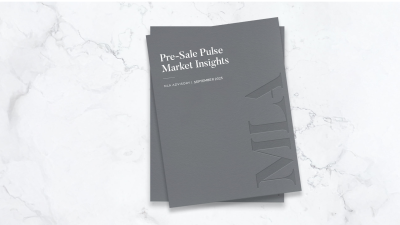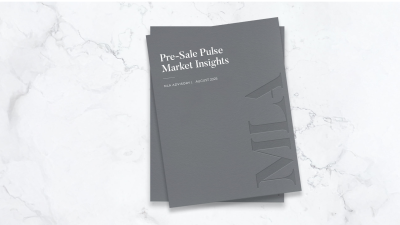April 2025 Real Estate Market Insights
Welcome to the April 2025 episode of the Presale Pulse, a real estate show brought to you by hosts Suzana Goncalves and Brittany Reimer. Watch the video to understand the latest macroeconomics, presale, and resale trends over the last 30 days affecting the local real estate market across Metro Vancouver and the Fraser Valley.
On the Run? Don't miss a beat. Listen to this Episode.
Macroeconomics: Rising Inflation and Shaken Confidence Signal a Rocky Start to 2025
Inflation rose sharply to 2.6% in February, up from 1.9% the month prior — marking the first time since October that inflation has exceeded the 2% threshold. Without the temporary GST tax break still in effect for part of February, inflation would have likely approached 3%. Meanwhile, GDP growth posted a modest 0.4% increase in January, technically aligning with the Bank of Canada's 2% annualized growth target. However, economists caution that this momentum may be short-lived, as much of January’s growth stemmed from companies rushing goods across the border ahead of new tariffs. Early February estimates suggest flat economic growth, reinforcing concerns that the economy is already slowing despite previous signs of resilience.
Compounding the issue, consumer confidence plummeted to a record low in March, with nearly 34% of Canadians believing their financial situation will worsen — the highest level of pessimism recorded since the onset of COVID-19. Job market data is equally troubling: while 33,000 jobs were reported lost, a deeper look reveals that 62,000 full-time jobs vanished, partially offset by part-time employment gains. Since interest rate hikes began in 2022, purchasing power has been under pressure, and even with recent rate declines, consumer sentiment remains weak. Rising inflation, tariff uncertainty, and the threat of further job losses are weighing heavily on Canadians, leading to reduced consumer spending and signaling ongoing challenges for economic recovery.
Presale: Activity Softens Amid Cautious Buyer Sentiment
March saw a quieter presale market than anticipated, with six projects launching across Metro Vancouver and the Fraser Valley, bringing just over 910 units to market. While close to earlier forecasts, this figure still lags behind historical norms — the five-year March average typically sees around 10 project launches and over 1,300 units. Even adjusting for the outlier year of 2022, the market remains underperforming compared to averages. Larger concrete launches like 102 + Park and Signature at River Green helped prop up unit counts, but overall, project launches are down by nearly half compared to last year, with unit volume at just 60%. Developer hesitation is clear, with many taking a month-by-month approach to market timing, using previews to gauge interest before committing to contract writing. Ongoing economic and political uncertainty, particularly surrounding tariffs and the upcoming federal election, continues to paralyze buyer decision-making.
Same-month absorptions further illustrate the slowdown, with just 8% of newly released units sold in March — a sharp contrast to the 27% absorption rate seen this time last year and well below the five-year average of 41%. Buyers are increasingly adopting a wait-and-see approach, reluctant to make major purchase decisions until after election outcomes and broader market conditions settle. Looking ahead, April is forecasted to see a slight uptick, with eight projects expected to launch, adding approximately 1,145 new units. Half of these new launches will be townhome product, aligning with current buyer preferences for faster occupancy timelines and relative affordability. Notably, Kwasen Village by Aquilini Group is the lone concrete launch, marking the first phase of a 21-building master-planned community. As uncertainty persists, opportunities continue to exist for buyers ready to act decisively in a slower-paced market.
Resale: Inventory Climbs and Buyers Gain Leverage as Spring Market Softens
Spring brought a modest uptick in sales activity across Metro Vancouver and the Fraser Valley, but momentum remains well below historical norms. Greater Vancouver recorded 2,091 sales in March, up 14% from February but still down 13% year-over-year — marking the slowest March since 2019. In the Fraser Valley, sales increased by 12.6% month-over-month but were nearly 26% lower compared to last year, resulting in the slowest start to the spring season in over 15 years. Buyers remain cautious amid ongoing economic uncertainty, with concerns about tariffs and the approaching federal election driving a wait-and-see attitude. Inventory has surged as a result, with active listings reaching 14,546 in Greater Vancouver (up 38% year-over-year) and 9,219 in the Fraser Valley (up nearly 49%). Both regions now have inventory levels well above their 10-year seasonal averages, offering buyers a broader selection and stronger negotiating power.
Despite softer sales activity, prices have remained relatively stable. Greater Vancouver home prices saw a slight 0.5% month-over-month appreciation, though values are still down 0.6% from a year ago. In the Fraser Valley, prices edged up by 0.4% month-over-month but remain 3.5% lower year-over-year. With mortgage rates easing, sellers becoming more flexible, and an abundance of listings on the market, conditions are increasingly favorable for buyers who are ready to act. Greater Vancouver’s sales-to-active listings ratio sits at 14.9%, pointing to a balanced market, while the Fraser Valley remains firmly in buyer’s market territory at 11.2%. Overall, the spring market presents an ideal environment for those looking to find good value — provided they are willing to navigate a still-cautious and competitive landscape.
Presale Projects mentioned in this episode:
- 102+ Park - Marcon
- Signature at River Green - ASPAC Developments
- Kwasen Village - Aquilini Group
- MATTEŌ - ML Emporio Properties Ltd.
- Satori - Everglade Development
Links mentioned in this episode:
- April 2025 Presale Pulse Report
- MLA Advisory Services and Sample Reports
- Contact Advisory
- Subscribe to MLA Newswire
Subscribe to the MLA Canada YouTube Channel or find the Presale Pulse on your favourite audio streaming platform: Apple, Spotify, Amazon Music, iHeart Radio


